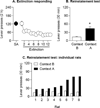Context-induced relapse to alcohol seeking after punishment in a rat model
- PMID: 22883434
- PMCID: PMC3517691
- DOI: 10.1016/j.biopsych.2012.07.007
Context-induced relapse to alcohol seeking after punishment in a rat model
Abstract
Background: Rat studies have demonstrated that exposure to environments associated with alcohol intake reinstates alcohol seeking after extinction of alcohol-reinforced responding in a different context. However, extinction is limited as an abstinence model, because humans typically abstain because of negative consequences associated with excessive drinking. It is currently unknown whether alcohol-associated contexts can provoke relapse to alcohol seeking after alcohol-taking behavior is suppressed by adverse consequences in a different context.
Methods: Alcohol-preferring P rats were first given home-cage access to 20% ethanol. Next, they were trained to self-administer 20% ethanol in one context (context A). Subsequently, all rats continued to self-administer alcohol in a different context (context B). For one group, 50% of alcohol-reinforced responses were punished by mild footshock; two other groups either received noncontingent shocks or no shock. A fourth group was given extinction training in context B. All rats were then tested for relapse to alcohol seeking under extinction conditions in contexts A and B.
Results: In Context B, alcohol-taking behavior was suppressed by contingent shock (punishment) and extinction training but not by noncontingent shock. In Context A, relapse to alcohol seeking was reliably observed in the punished and extinction groups; a context switch had no effect on alcohol seeking in the no-shock or noncontingent shock groups.
Conclusions: Our data indicate that punishment-induced suppression of alcohol-taking behavior is context-dependent. We propose that our procedure can be used to explore mechanisms of context-induced relapse to alcohol seeking after alcohol-taking behavior is suppressed by adverse consequences.
Copyright © 2013 Society of Biological Psychiatry. Published by Elsevier Inc. All rights reserved.
Conflict of interest statement
Figures



Similar articles
-
A critical role of nucleus accumbens dopamine D1-family receptors in renewal of alcohol seeking after punishment-imposed abstinence.Behav Neurosci. 2015 Jun;129(3):281-91. doi: 10.1037/bne0000050. Epub 2015 Apr 27. Behav Neurosci. 2015. PMID: 25914922 Free PMC article.
-
Role of Ventral Subiculum in Context-Induced Relapse to Alcohol Seeking after Punishment-Imposed Abstinence.J Neurosci. 2016 Mar 16;36(11):3281-94. doi: 10.1523/JNEUROSCI.4299-15.2016. J Neurosci. 2016. PMID: 26985037 Free PMC article.
-
Opposite Effects of Basolateral Amygdala Inactivation on Context-Induced Relapse to Cocaine Seeking after Extinction versus Punishment.J Neurosci. 2018 Jan 3;38(1):51-59. doi: 10.1523/JNEUROSCI.2521-17.2017. J Neurosci. 2018. PMID: 29298908 Free PMC article.
-
Context-induced relapse after extinction versus punishment: similarities and differences.Psychopharmacology (Berl). 2019 Jan;236(1):439-448. doi: 10.1007/s00213-018-4929-1. Epub 2018 May 24. Psychopharmacology (Berl). 2019. PMID: 29799072 Free PMC article. Review.
-
Animal models of drug relapse and craving: From drug priming-induced reinstatement to incubation of craving after voluntary abstinence.Prog Brain Res. 2016;224:25-52. doi: 10.1016/bs.pbr.2015.08.004. Epub 2015 Nov 4. Prog Brain Res. 2016. PMID: 26822352 Review.
Cited by
-
Extinction of instrumental (operant) learning: interference, varieties of context, and mechanisms of contextual control.Psychopharmacology (Berl). 2019 Jan;236(1):7-19. doi: 10.1007/s00213-018-5076-4. Epub 2018 Oct 22. Psychopharmacology (Berl). 2019. PMID: 30350221 Free PMC article. Review.
-
Response-specific effects of punishment of a discriminated operant response.Learn Motiv. 2023 Aug;83:101907. doi: 10.1016/j.lmot.2023.101907. Epub 2023 Jun 12. Learn Motiv. 2023. PMID: 37484761 Free PMC article.
-
Reduced alcohol-seeking in male offspring of sires exposed to alcohol self-administration followed by punishment-imposed abstinence.Pharmacol Res Perspect. 2018 Feb 15;6(2):e00384. doi: 10.1002/prp2.384. eCollection 2018 Apr. Pharmacol Res Perspect. 2018. PMID: 29468070 Free PMC article.
-
Incubation of methamphetamine and palatable food craving after punishment-induced abstinence.Neuropsychopharmacology. 2014 Jul;39(8):2008-16. doi: 10.1038/npp.2014.50. Epub 2014 Mar 3. Neuropsychopharmacology. 2014. PMID: 24584329 Free PMC article.
-
Preventing relapse after incentivized choice treatment: A laboratory model.Behav Processes. 2017 Aug;141(Pt 1):11-18. doi: 10.1016/j.beproc.2017.02.005. Epub 2017 Feb 7. Behav Processes. 2017. PMID: 28188809 Free PMC article. Review.
References
-
- O'Brien CP, Childress AR, McLellan AT, Ehrman R. Classical conditioning in drug-dependent humans. Ann N Y Acad Sci. 1992;654:400–415. - PubMed
-
- Staiger PK, White JM. Cue reactivity in alcohol abusers: Stimulus specificity and extinction of the responses. Addictive Behaviors. 1991;16:211–221. - PubMed
-
- Wikler A. Dynamics of Drug Dependence: Implications of a Conditioning Theory for Research and Treatment. Arch Gen Psychiatry. 1973;28:611–616. - PubMed
-
- Collins BN, Brandon TH. Effects of extinction context and retrieval cues on alcohol cue reactivity among nonalcoholic drinkers. J Consult Clin Psychol. 2002;70:390–397. - PubMed
-
- McCusker CG, Brown K. Alcohol-predictive cues enhance tolerance to and precipitate "craving" for alcohol in social drinkers. J Stud Alcohol. 1990;51:494–499. - PubMed
Publication types
MeSH terms
Substances
Grants and funding
LinkOut - more resources
Full Text Sources
Other Literature Sources

